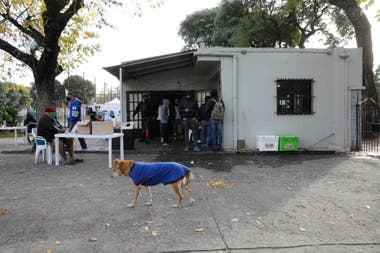He
grooming
It is a cybercrime that is characterized by the harassment by an adult of children and adolescents through the Internet to obtain
some kind of sexual gratification or sexual images.
How does it work?
Silvia Ongini, child and youth psychiatrist in the pediatric department of the Hospital de Clínicas and co-author of the book
The super power of sex education
, explains that the boys or girls begin to chat with a new virtual friend supposedly their age. They do not know it, but this new “friend” is an adult who uses a language common to the child or adolescent to start some type of bond of great trust. The impostor collects important information such as the school the boy goes to or what his inner circle is. Meanwhile, convince that boy or girl to “play” something erotic like taking a nude photograph.
When
the camouflaged adult’s demands begin to become increasingly explicit and abusive
, the minor refuses to comply with them, unleashing a process of extortion using the data that the same victim gave. The threats are in the style of “I’m going to send the photos you shared to your parents or classmates.” At this point, the children are already absolutely terrified and are forced to continue with a game that can have very serious consequences for their mental health.
How frequent is it?
It is a latent danger for thousands of children and adolescents, considering that
35% were ever asked to send nude or scantily clad photos
and that
33% received images or videos of sexual content from a stranger
who contacted them online. The alarming figures come from a recent report by the organization Grooming Argentina, according to which six out of 10 boys and girls between 9 and 17
talk to strangers on the Internet
and three out of 10 ever personally met someone they contacted through that means.
In which social networks can it occur?
Sebastián Bortnik, expert in computer security and founder of the organization Argentina Cibersegura, explains that gooming is a massive computer attack. “These criminals launch in search of any boy or girl, not one in particular, although when they find a potential victim, they advance with it,” he describes. The simple connection to any digital platform enables the possibility that a boy or girl (generally between 8 and 16 years old) is captured. “Wherever there are chats and children on the other side, there can be grooming,” says the specialist.
It can be through Facebook, Instagram, WhatsApp or online games.
Hernán Navarro, founder of Grooming Argentina, adds:
“These criminals are
sexual predators that is on the hunt
”
How can being a victim of grooming impact boys and girls?
Ongini, who has a vast track record on the subject and is co-founder of the Center for Assistance and Prevention of Sexual Abuse in Children and Adolescents (Cepasi), explains that when a boy, girl or adolescent is exposed to being a victim of grooming, “what is constituted is a traumatic situation exactly the same as that of sexual abuse” because “they are exposed to sexual matters for which they are often not psychically or maturely prepared to be able to prosecute”. In addition, she details that another of the grooming traps is that the victim ends up considering that she is also guilty of what happened.
What role should we adults take in early detection and prevention?
According to Ongini, in order for boys or girls who are victims of grooming to get ahead, they will need the
immediate containment and a favorable response from the family. Although we cannot control all the variables, there are certain issues related to education that can make boys and girls “less likely to bite certain hooks.” “We must teach children and adolescents to take care of themselves to avoid abuse and, in the worst case, to defend themselves against them by counting on us as allies. The problem is that no matter how educated our sons and daughters are, due to immaturity Some things definitely won’t be able to cope with your brain alone, “says Ongini. This is one of the reasons why it indicates that the ideal is that until the age of 14, boys should not create profiles on the networks or use them in the way that adults do, that is, with total privacy and without anyone have access to your accounts.
The advice of the specialist María Zysman for mothers and fathers
03:39
On the other hand, from Grooming Argentina they warn about the need for the commitment of adults to strengthen their knowledge in digital matters. “In this way we will be able to build standards of coexistence on the Internet, based on preventive actions and adopting a responsible and safe use of technology. The lack of information in adults affects a significant number of potential complaints that never reach justice, coexisting in the impunity of the black figures, “says Navarro.
María Zysman, psycho-pedagogue and founder of Libres de Bullying, considers that the first tip to work with boys is
build a bond of trust,
“transmit to them that if they ever feel fear, disgust, rejection of any content they are consuming or face an exchange with a person, they have to ask for help from mom, dad, an older brother, grandmother or any reference adult in order to detect risk situations”. Teaching them to configure their security options, to be critical of what they see on the internet, that there are things that are not shared and spaces that are intimate, are some of the keys. But, above all, generating channels of dialogue. In this sense, Zysman points out that installing parental control applications on the boys’ technological devices is a valid option, “but much more important is offering us as a reference so that they not only speak, but shout every time someone asks them to keep on secret your relationship. ”
Tips for parents
-
Get involved:
the adult is always responsible, there is no such thing as “boys alone manage technology, they understand more than I do”. On the contrary, boys and girls should feel that they have the support of an older person, even when it comes to the Internet. -
Find out about what it is and the consequences of grooming:
Find out how it works, how many cases there have been lately, if there are new modalities, etc. -
Talk to the boys:
just as we would with respect to other risks that you may face in your life, with confidence and generating a framework of containment. You can always take as a topic of conversation the things that make us noise and that seem strange to us from the web. Incorporating it into daily life is important. Just as we asked them “how did it go today?”, Let’s begin to incorporate the “what did you see today in the networks?” to naturalize the act of sharing the things that caught our attention. -
Teach them basic rules:
explain that on the other side of the screen a person may be lying about their identity; that they should not speak to strangers, and if they do, limit the conversation to the issues at hand, for example, if they are playing online, discuss the strategy; never disclose information such as address, phone numbers, names of the school they attend, much less access requests such as taking off clothes, showing a photo or following conversations of a sexual nature. And if that happens, know that they should ask for help and that contact should be stopped. -
Other tips when connecting:
seeks to limit the number of people who accept as friends or contacts in networks or groups; It controls the people they talk to and the type of content they use in those communications. -
On devices:
I knew the navigation systems; Read the privacy policies when downloading applications, such as whether you need to be of legal age to download them; among others.
More information
ALSO
.
Publicado en el diario La Nación




